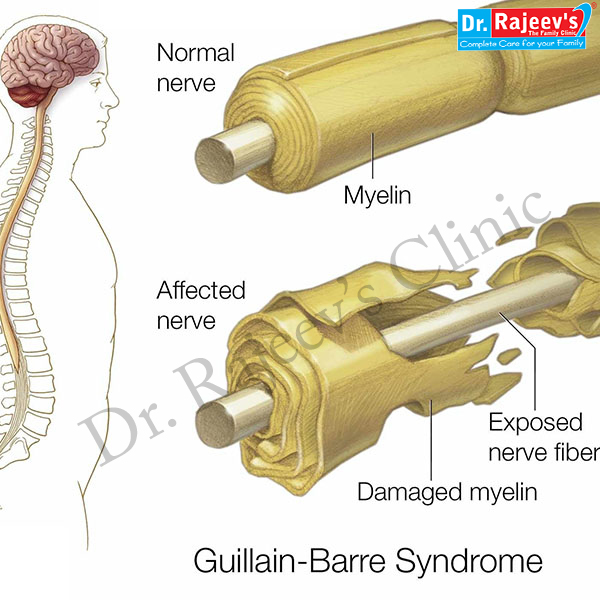

Guillain-Barré syndrome is an acute illness which is caused by inflammation of peripheral nerves leading to loss of sensation, muscle weakness and, in more serious cases, complete paralysis and breathing difficulty. In almost eighty percent of children these symptoms follow a recent illness (usually viral). This infection is thought to trigger a faulty response in the immune system.

The disease varies in speed of onset with children reaching their maximal disability over a matter of days or, much more gradually over a period of up to four weeks.
SYMPTOMS OF GUILLAIN-BARRE SYNDROME
Guillain-Barre syndrome often begins with tingling and weakness starting in our feet and legs and spread/ing to your upper body and arms. In about 10% of people with the disorder, symptoms begin in the arms or face. As Guillain-Barre syndrome progresses, muscle weakness can evolve into paralysis.
Signs and symptoms of Guillain-Barre syndrome may include:
People with Guillain-Barre syndrome usually experience their most significant weakness within two weeks after symptoms begin.
Once thought to be a single disorder, Guillain-Barre syndrome is now known to occur in several forms. The main types are:
The exact cause of Guillain-Barre syndrome isn't known. The disorder usually appears days or weeks after a respiratory or digestive tract infection. Rarely, recent surgery or vaccination can trigger Guillain-Barre syndrome. Recently, there have been cases reported following infection with the Zika virus. Guillain-Barre syndrome may also occur after COVID-19 infection.
Guillain-Barre syndrome can affect all age groups. But your risk increases as you age. It's also more common in males than females.
Guillain-Barre syndrome may be triggered by:
Guillain-Barre syndrome affects your nerves. Because nerves control your movements and body functions, people with Guillain-Barre may experience:
The diagnosis of Guillain-Barré syndrome is confirmed with a combination of lumbar puncture, where a high protein content is demonstrated in the cerebrospinal fluid and nerve conduction studies, which show slowing of nerve conduction in the nerve roots and/or peripheral nerves.
Recovery usually begins in two to three weeks and may be accompanied by pain and tingling in the limbs. Most children are able to walk unaided by six weeks and most are free from symptoms by about three months. Minorities of patients have some residual problems but these children are usually still able to walk unaided. The condition can occur at any age but there appear to be peak ages of onset in childhood at four years and twelve years. In general children make a much better recovery than adults.
In Guillain-Barré syndrome the body's immune system attacks part of the peripheral nervous system. Usually Guillain-Barré occurs a few days or weeks after the patient has had symptoms of a respiratory or gastrointestinal viral infection. The body's immune system begins to attack the body itself, causing what is known as an autoimmune disease.
Lathyrus, Phosphorus, Thuja, Calcarea Carb.
RL 40,RL 16